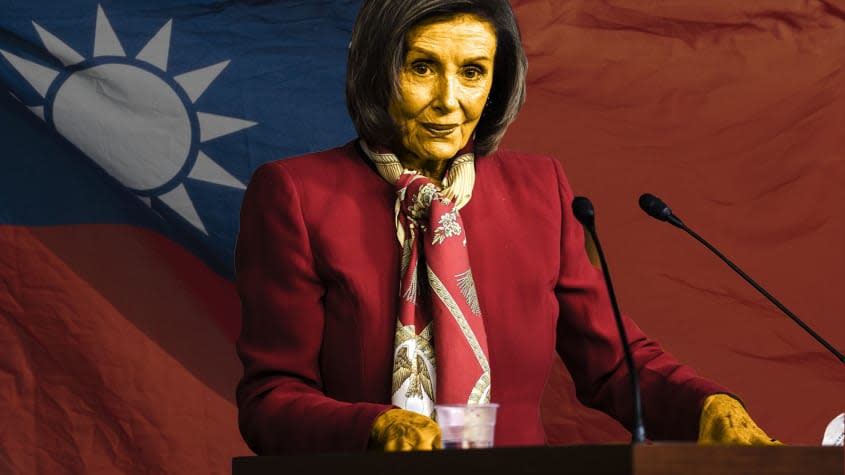The controversy over Nancy Pelosi's Taiwan trip, explained

- Oops!Something went wrong.Please try again later.
Is Nancy Pelosi going to provoke a war with China?
The House Speaker, a California Democrat, reportedly plans to visit Taiwan in August, throwing the already-tense relationship between China and the United States into something of a tizzy. Beijing — which considers Taiwan a breakaway province — has reportedly issued "private warnings" to U.S. officials against Pelosi's trip. And some of the warnings have been not so private: "If the U.S. side is bent on going its own way, China will take strong measures to resolutely respond and counteract," Chinese government spokesman Zhao Lijian said on Monday.
American leaders already fear that China will move to take over Taiwan sometime in the near future, and those fears "have sharpened" as the Biden Administration "quietly works to try to dissuade" Pelosi from traveling to the island, The New York Times reports. And ominously, analysts say "that China could send aircraft to 'escort" her plane and prevent it from landing," though that scenario is considered unlikely. Tensions are high enough that Taiwanese officials have started holding air raid drills in preparation for Pelosi's visit.
Why is Pelosi's planned visit causing so much controversy? Here's everything you need to know:
Why is Nancy Pelosi going to Taiwan?
Given all the hubbub, it might be surprising to learn that Pelosi hasn't officially announced a visit. "No final decision has been made about stopping in Taiwan during a trip to Asia" in August, Billy House and Iain Marlow report for Bloomberg. Her office "won't confirm or deny international travel because of security issues." (President Biden more or less confirmed her plans to reporters last week.) She reportedly scrapped a visit in April, when she caught the coronavirus. If she does make the trip, she would be the first House Speaker to visit the island since 1997.
But it probably shouldn't be a surprise if she's willing to poke China in the eye. She "has been a staunch critic of China throughout her more than three decades in Congress," The Associated Press reports — showing support for the 1989 Tiananmen Square protests and the 2019 democracy demonstrations in Hong Kong. That said, she's been careful not to overtly root for Taiwan's independence from China, probably in order to avoid too dire a provocation. "I think that it's important for us to show support for Taiwan," she told reporters last week. "I also think that we have … none of us has ever said we're for independence when it comes to Taiwan. That's up to Taiwan to decide."
Why is the trip stirring up trouble?
Taiwan and China have governed themselves separately since Chang Kai-shek and his army fled to the island after Mao Zedong and the Communist Party won control of mainland China in 1949. But China has always said that Taiwan is its territory. The United States has long observed a "one China" policy, officially recognizing the Communist regime in Beijing "as the sole legal government of China but only [acknowledging] the Chinese position that Taiwan is part of China," Michael J. Green and Bonnie S. Glaser wrote in a 2017 explainer for the Center for Strategic and International Studies. If that sounds confusing and ambiguous, that's pretty much the point: The U.S. has tried to discourage China from invading Taiwan — and has given Taiwan some military support — but it has also tried to keep peace by withholding a formal recognition of Taiwan's independence. Pelosi's visit could disrupt that delicate balance: China would see the trip by such a high-ranking American official "as being akin to formal diplomatic engagement with the island," says The New York Times.
But it's not just the U.S.-China relationship that's been thrown into turmoil. There's also Pelosi's relationship with Biden, who seemed to discourage the trip in his public remarks last week. And bizarrely, the speaker — who has long been reviled by House Republicans, and used extensively as a villain in their campaign commercials — is getting GOP backing for the trip. "Speaker Pelosi should go to Taiwan and President Biden should make it abundantly clear to Chairman Xi that there's not a damn thing the Chinese Communist Party can do about it," Sen. Ben Sasse (R-Neb.) said on Monday. Former House Speaker Newt Gingrich (R-Ga.) also backed Pelosi's trip.
So: Will her visit actually start a war?
Probably not? But it's clear that American officials are nervous about the possibility of a confrontation. Administration officials say China "is planning a potentially destabilizing response," to a Pelosi visit, columnist Josh Rogin writes for the Washington Post. U.S. military leaders are contemplating "moving aircraft carriers or sending fighter planes for close air support" in order to protect the speaker, but that could create problems, too: China could see such actions as an "aggressive rather than a defensive measure."
The fear is that Chinese President Xi Jinping will view Pelosi's visit to Taiwan "as a humiliation of his leadership and that he takes some rash action to show his strength," Susan L. Shirk, a former senior State Department official, told the Times. Shi Yinhong, a professor at Renmin University of China in Beijing, told the paper he doesn't think the regime would want to provoke an actual conflict. But nobody really knows. "I don't think anyone can predict in any detail what China will do militarily."
You may also like
Ex-Republicans and Democrats form Forward, a new centrist political party

